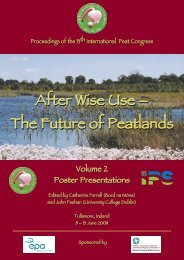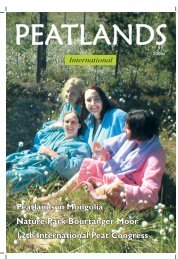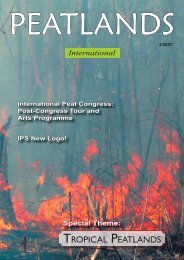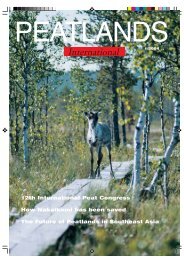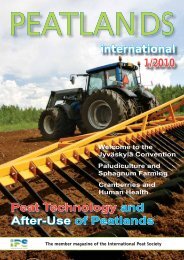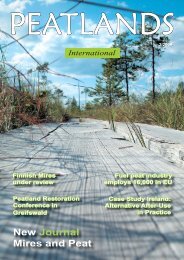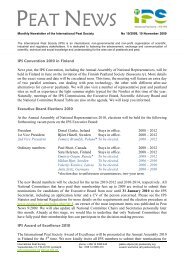peatlands 1 taitto.indd - International Peat Society
peatlands 1 taitto.indd - International Peat Society
peatlands 1 taitto.indd - International Peat Society
You also want an ePaper? Increase the reach of your titles
YUMPU automatically turns print PDFs into web optimized ePapers that Google loves.
•<br />
•<br />
emissions, and maintain ecological<br />
services.<br />
Improve current forestry, agriculture<br />
and plantation management<br />
practices to ensure that they<br />
contribute to the sustainability of<br />
<strong>peatlands</strong>.<br />
Promote international cooperative<br />
studies to assess the role of <strong>peatlands</strong><br />
in mitigating climate change<br />
and the potential future impacts<br />
•<br />
of climate change and land use on<br />
the peatland carbon pool.<br />
Undertake an assessment of the<br />
vulnerability of <strong>peatlands</strong> to climate<br />
change and extreme events.<br />
Effectively disseminate the knowledge<br />
generated by the scientifi c<br />
community for use by decision<br />
makers and to support the assessment<br />
processes and later develop<br />
adaptation strategies to guide<br />
Dutch Government Fights Fires in Kalimantan<br />
Almost annually, fires in<br />
Kalimantan destroy enormous<br />
areas for ever and<br />
cause shocking air pollution<br />
throughout the region. A<br />
network of NGO’s will start<br />
working to protect and restore<br />
these threatened areas.<br />
A major project aimed at the conservation<br />
and restoration of the peat<br />
swamps and their forest of Central<br />
Kalimantan has received the green<br />
light from the Netherlands’ Ministry<br />
of Foreign Affairs. The government of<br />
the Netherlands will be investing 5 million<br />
Euros in the coming two years on<br />
the basis of the “<strong>Peat</strong> Forest Amendment”<br />
which was passed in the Dutch<br />
parliament on November 14, 2004.<br />
The Central Kalimantan <strong>Peat</strong>lands<br />
Project (CKPP) will be implemented<br />
by four locally operating NGOs (Wetlands<br />
<strong>International</strong>, WWF, CARE and<br />
BOS), the provincial planning agency<br />
in Kalimantan (BAPPEDA) and<br />
the University of Palangkaraya. The<br />
project will be managed by Wetlands<br />
<strong>International</strong> head quarters based in<br />
Wageningen, the Netherlands.<br />
The network of environmental<br />
NGOs will focus on four key activities:<br />
1) fi re prevention, 2) restoration<br />
of the peatland hydrology (closing<br />
drainage channels to prevent drying of<br />
the peat soil), 3) reduction of poverty<br />
through small-scale developments and<br />
4) biodiversity conservation. Concrete<br />
examples of the project work are the<br />
closing of drainage canals to re-wet<br />
and re-green degraded fi re-prone areas.<br />
Large parts of Kalimantan consist<br />
of <strong>peatlands</strong>, originally mostly forest-<br />
ed. These tropical peat swamp forests<br />
are the living area for many threatened<br />
species. In this regard, the project will<br />
focus on the Sebangau National Park<br />
and the Mawas area which hold the<br />
largest remaining population of Orang<br />
Utan. In recent years, a large proportion<br />
of the peat swamp forests have<br />
been turned into wastelands as a result<br />
of deforestation, over-drainage and<br />
badly planned agricultural development.<br />
These developments made the<br />
area very vulnerable for fi res. Almost<br />
annually, huge fi res take place, destroying<br />
both internationally important<br />
nature areas and important agricultural<br />
and forestry assets. The fi res cause major<br />
air pollution problems in surrounding<br />
countries. In 1997 alone, peatland<br />
fi res in Indonesia contributed over 1<br />
giga ton of carbon dioxide, compara-<br />
•<br />
peatland managers, in particular<br />
plantation operators.<br />
Strengthen activities for monitoring<br />
changes in the status of<br />
tropical <strong>peatlands</strong> to guide wise<br />
management. �<br />
Faizal Parish<br />
Global Environment Centre<br />
Selangor, Malaysia<br />
e-mail: fparish@genet.po.my<br />
web: www.gecnet.info<br />
ble with 15% of all annual global fossil<br />
fuel related emissions.<br />
The economic damage by smoke<br />
and losses in the tourism & timber sectors<br />
were estimated at over 8.4 billion<br />
US$ in 1997 alone. People in the area<br />
suffer heavily from the fi res. About<br />
30% of all children under 5 years<br />
suffer from respiratory diseases and<br />
linked growth inhibition due to the air<br />
pollution.<br />
The project is a fi rst step to stop<br />
this disaster, protect the remaining peat<br />
swamp forests and to promote sustainable<br />
land use. �<br />
Marcel J. Silvius<br />
Wetlands <strong>International</strong><br />
PO Box 471, 6700 AL Wageningen<br />
The Netherlands<br />
phone: +31 6 295 86 096<br />
e-mail: marcel.silvius@wetlands.org<br />
Replanting burned forest: Local villagers cooperate in the rehabilitation of degraded <strong>peatlands</strong><br />
by planting useful indigenous peat forest species like Jelutung, which produces latex used for<br />
the production of chewing gum. Photo: Alue Dohong, WI<br />
19



